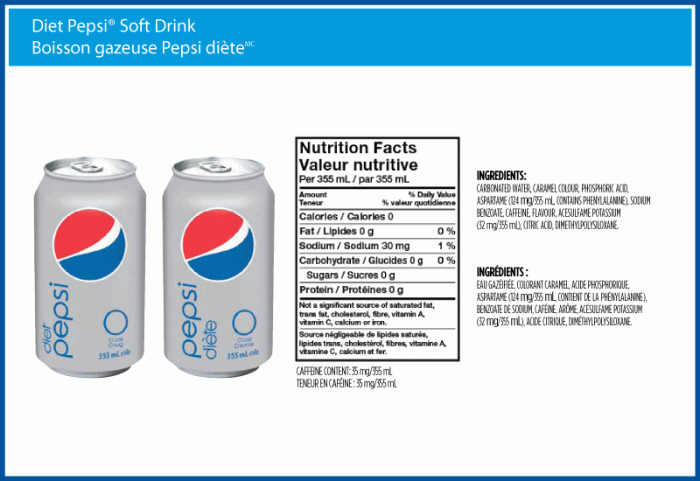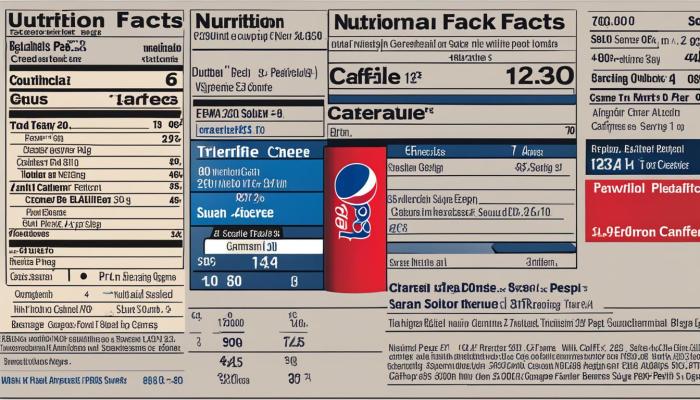Nutritional Information Breakdown: Diet Pepsi Nutrition Facts

Diet pepsi nutrition facts – Diet Pepsi, a popular sugar-free beverage, offers a refreshing taste without the caloric burden of its sugary counterparts. Understanding its nutritional profile is crucial for those watching their calorie intake or managing specific dietary needs. This section provides a detailed breakdown of the nutritional information found in a standard serving of Diet Pepsi.
Caloric Content, Carbohydrate Content, and Sugar Content
A standard 12-ounce serving of Diet Pepsi contains zero calories, zero grams of carbohydrates, and zero grams of sugar. This is primarily due to the use of artificial sweeteners instead of sugar. The absence of these components makes Diet Pepsi a suitable choice for individuals following low-calorie or low-carbohydrate diets. However, it’s important to note that the long-term health effects of artificial sweeteners are still under investigation.
Vitamins and Minerals, Diet pepsi nutrition facts
Diet Pepsi does not contain any significant amounts of vitamins or minerals. It is essentially composed of carbonated water, artificial sweeteners, and flavorings. Therefore, it should not be considered a source of nutritional value. Relying solely on Diet Pepsi for hydration and nutrient intake is not recommended; a balanced diet rich in fruits, vegetables, and whole grains remains essential for overall health and well-being.
Diet Pepsi’s nutritional profile is famously low in calories and carbohydrates, relying heavily on artificial sweeteners. However, comparing this to the natural sugars and vitamins found in other beverages is insightful; for instance, a contrasting look at orange juice nutrition facts reveals a much higher caloric and vitamin C content. Ultimately, choosing between Diet Pepsi and orange juice depends entirely on individual dietary needs and preferences.
Nutritional Information Summary
The following bullet point list summarizes the nutritional information of a 12-ounce serving of Diet Pepsi:
- Calories: 0
- Total Carbohydrate: 0g
- Sugars: 0g
- Fat: 0g
- Protein: 0g
- Vitamins and Minerals: None in significant amounts
Impact of Artificial Sweeteners

Diet Pepsi, like many diet sodas, relies on artificial sweeteners to provide sweetness without the calories of sugar. Understanding the long-term effects of these sweeteners on the body is crucial for making informed choices about consumption. While often marketed as a healthier alternative, the metabolic impact of artificial sweeteners remains a subject of ongoing research and debate.Artificial sweeteners, primarily aspartame and acesulfame potassium in Diet Pepsi, interact differently with the body compared to natural sugars like sucrose (table sugar) or fructose (fruit sugar).
Natural sugars are readily metabolized, providing energy and triggering insulin release to regulate blood sugar levels. Artificial sweeteners, however, do not provide significant caloric energy and their impact on insulin release and metabolic processes is less clear-cut, leading to complex and sometimes contradictory findings.
Metabolic Responses to Natural Sugars versus Artificial Sweeteners
Natural sugars are broken down into glucose, providing energy for cellular function. This process stimulates insulin production, which helps transport glucose into cells for energy use or storage. In contrast, artificial sweeteners bypass this traditional metabolic pathway. They stimulate minimal insulin release, and because they don’t offer caloric energy, the body doesn’t receive the same energy signal. This difference in metabolic response can lead to varied effects on appetite regulation and overall metabolic health.
For example, some studies suggest that the lack of caloric response from artificial sweeteners can lead to increased cravings and potentially contribute to weight gain in some individuals, although other studies have shown no such effect.
Potential Health Risks Associated with Regular Consumption of Diet Pepsi
While the long-term effects of artificial sweetener consumption are still being researched, several potential health risks have been identified and are subjects of ongoing investigation. These include potential links to increased risk of metabolic syndrome, changes in gut microbiota, and certain types of cancer. It is important to note that many of these associations are correlative, not necessarily causative, and further research is needed to establish definitive causal relationships.
The potential effects vary depending on factors like individual genetics, overall diet, and lifestyle. For example, one study linked increased consumption of diet soda with a higher incidence of cardiovascular issues, however, the correlation doesn’t prove causation and other factors may be at play.
Illustrative Representation of Artificial Sweetener Processing
Imagine a simplified diagram. On one side, a natural sugar molecule (e.g., glucose) enters the digestive system. It is broken down and absorbed, triggering a cascade of events: the pancreas releases insulin, glucose enters cells, and energy is produced. The process concludes with the utilization or storage of energy. On the other side, an artificial sweetener molecule (e.g., aspartame) enters the digestive system.
It is detected by taste receptors, triggering a sweetness signal to the brain, but it bypasses the typical metabolic pathway for energy production. Minimal insulin is released, and the molecule is largely excreted without significant energy contribution. This difference in pathways explains the differing metabolic responses to natural sugars and artificial sweeteners. It’s important to remember this is a simplified representation; the actual metabolic processes are far more complex.
FAQ Section
Does Diet Pepsi contain any calories?
Diet Pepsi contains virtually zero calories.
Is Diet Pepsi safe for diabetics?
While it’s sugar-free, it’s crucial for diabetics to consult their doctor before regularly consuming Diet Pepsi as it might still affect blood sugar levels indirectly and isn’t a replacement for proper diabetic management.
What are the main artificial sweeteners in Diet Pepsi?
The primary artificial sweeteners in Diet Pepsi vary by region but commonly include aspartame and acesulfame potassium.
Can Diet Pepsi cause tooth decay?
While it doesn’t contain sugar, the acidity of Diet Pepsi can still contribute to tooth enamel erosion. Good oral hygiene is still important.